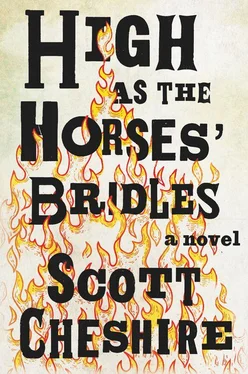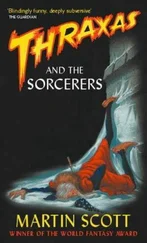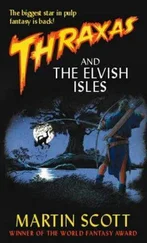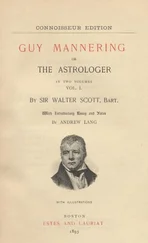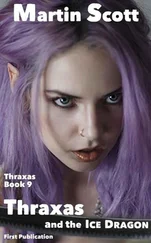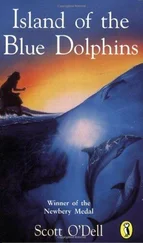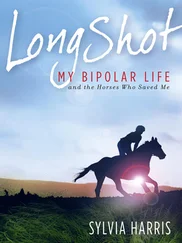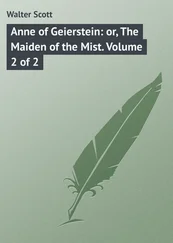A long wooden shelf hangs above.
He pulls over a crate and climbs up onto the table. From here the ceiling joists are that much closer. Chickens hop on the hard, packed dirt showing through a thinning layer of hay grass. Need to lay more hay grass. The black sow is asleep, her broad back rising in breath. The sun bursts between the roof boards, and he covers his eyes.
He takes a wooden box and a shallow clay bowl from the shelf, and climbs down.
The bowl is filled with calcified nail shavings, glass-sharp hoof cuttings, the remnants of a dead horse’s tail. In the box are the remains of a King James Bible, a spilling bag of corks and bungs, and a pile of modest handmade crucifixes. The Montgomery boy showed him how to make them. He chooses one of the smaller ones, no taller than his thumb. A crude dying Christ hangs from the cross like a loose frayed ribbon. He opens the Bible at random, and points his finger on the page. He reads the verse out loud like his daddy taught him: “Be not righteous over much. Neither make thyself over wise. Why shouldest thou destroy thyself?”
He tears the page from the binding.
He spreads the page on the table and places the wooden Christ in its center. Chooses two large crescentlike hoof cuttings, and pulls a long black hair from the horse’s tail. He scatters the cuttings over the Christ, folds the paper over its contents. He carefully ties the bundle with the hair strand. He then works the small bundle into the open mouth and drops it into the jar’s clay belly. Chooses a leather cork, takes the fire tongs from the table, and leaves the barn.
Around back, he sets the jar on the ground and removes the top cover of a barrel. It’s half full, and a cloud stink of urine opens upward, hot and metallic. The lean smell of cow piss rides on the rich rot of aged, wet wood, filling his nostrils with a sting and making him nauseated. He spits. The barrel’s been full for weeks and the urine is dark, taking on the color of the wood like a whiskey. A crucifix floats there, sacralizing the urine aged and now turned to lant. He grabs the jar in the grip of the tongs, pressing the neck of the bottle up against the hinging pivot of the tongs, and he immerses it. The clay bearded face goes under. He pulls the jar from the barrel, made new, full and baptized in the sacred lant.
He stuffs the cork into the brimming mouth and it spits warm spume along the sides. He hammers the cork in with the butt of his fist, and then against the barrel. He wipes the sweat from his face and leans against the barn, feeling woozy. Walking back to the hole by the river, he allows himself some real satisfaction in his work, thinking of sitting down soon in the cool summer grass and the breeze drying his cold wet back, thinking of his mother, of the fine morning, and the good luck piss jars bring.
* * *
Orr takes a piece of hard bread and dips it in the ham grease his father left out for him. He stuffs his mouth, crumbs falling. It’s well past noon, closer to evening, and his father should’ve been home by now. From outside there comes a nervous barking. It’s the red dog on its belly. Beside the door, the fire in the pot stove shrivels inward, its blue leaves going cooler. Chewing on the bread, he goes outside and sees a wagon coming from the wood. He shushes the dog, kicks its haunches, and it runs. It’s a large covered carriage, white-tented, and the horses are slowly moving. He picks up a stone from the ground, cocks back his arm. The dog darts toward the path, barking, yipping.
The wheels of the wagon are large and white, spokes blue and red. The finest wagon he’s ever seen. He throws his body forward with the stone, but misses hitting the dog. He picks another from the grass. The wagon comes closer and the driver wears a hat tipped low, blocking his face. The horses have silver blinkers on their eyes, rebounding bursts of sunlight. Orr squints, walking closer to the dog. He throws the stone, and immediately wishes he hadn’t. The dog cries out and turns toward Orr, tongue hanging, before running back to the river.
“Why’d you hurt your dog?” the driver shouts.
The wagon has pulled off the stone path, and moves quietly now in the grass. Not yet looking at the man, he stares at the wagon, at this rude turn. The horses are close now, slowing the rumble of their breathing, fume and spit fogging from their dark nostrils. On the side of the tent in large red and blue letters: “Langley’s Daring Circus Show.”
“Seems like a fine dog,” the man says, a deep and croaking voice.
Orr looks up past the wagon wheels, past the horses’ shoulders, their silver blinkers, to the dark man sitting in the seat.
“You’re a negro,” he says.
“And you’re not blind at all.”
The man climbs down from the seat and wipes his pant legs clean. He stands straight, stretches backward, and yawns. The biggest man Orr’s ever seen. The man arches his back as he yawns. His thick and shining chestnut arms are raised and rearing.
Orr steps back. “Not my dog.”
“Don’t matter.” The man’s hairline is far back on his head, and his hair is round and cut short. He wears a black silk neck cloth and a silver ring on his pinky finger.
Orr says, “What do you want?”
The man bows some. “Your folks around? Maybe some water for my team?”
Orr looks back at the canebrake, how he can see right through it, no cover. “My daddy’s right inside.”
The man turns for the house. “Maybe you could you make us acquainted.”
Orr picks up another stone, a larger one from the ground.
“I’m no dog, son. Put it down.”
“My daddy’s around. By the river.”
“I think maybe we did this wrong.” He loosens his neck cloth. “You know some negroes, don’t you?”
“My daddy says you all are good workers even when you got no choice.”
The man laughs. “True enough. You a hard worker?”
“I am.” He calls to the red dog coming back from the river. “Come here, dog.”
“Whose dog then?”
“Lots of dogs. Live all over, I guess. Some negroes live upriver in a small house. My daddy helped build it, and then he gave them a pig.” He looks up. “Your face looks like a black cherry.”
The man laughs. He looks at the back of his right hand and puts the hand behind his head. “Guess I do.”
“I mean the color of cherries.”
“I know what you mean.”
“I’ve seen some look more dark.”
“Well my daddy’s the color of blackberries. And I just had me a handful back there, so no harm.” He points back toward the wood, and then leans against the fence. “What’s your daddy look like?”
“How do you mean?”
The man waves away his question. “What’s your name?”
“Orr. Orren Laudermilk.”
“That’s a good name, Orr.” The man puts out his hand. “I’m Cotten.”
Orr throws the large stone toward the river. “My father looks like that.” He points to a shagbark hickory, bark layers draped like hairy shingles, and a white ring cut in the flesh. “Can’t get his face clean no matter what.”
Cotten laughs and wipes the back of his neck. “And where am I, exactly?”
Orr takes a half step forward. “Woodford. Where’d you come from?”
“Back east. Headed for Lexington.”
“You came too far west.” Orr pulls at the shirt sticking on his fevered skin. “We can take your horses to the river.”
“You’re a good neighbor.” Cotten begins unhitching the team. “You looking pale. You all right?”
“Just tired.”
“All right.”
Orr narrows his eyes, thinking on the man.
Cotten says, “I bet you’re wondering what I’m doing out here. Fine wagon, no white folk.”
“Ain’t my business.”
“That’s true.”
Читать дальше
